-
Film Review: Pride and Prejudice (2005)
Director: Joe Wright
Release date: September 2005
Plot summary: (a purposefully not very faithful adaptation of Jane Austen's eponymous masterpiece:) Elizabeth Bennet takes a strong dislike in Mr Darcy on their first encounter, while Elizabeth's sister, Jane, falls in love with Darcy's friend, Mr Bingley, who just moved in the neighbourhood. But as the plot advances, Elizabeth is bound to realise that Mr Darcy is not as proud and detestable as she thought, while Jane and Bingley have to overcome classical lovers' issues before being united.
Sorry, did my supposedly neutral plot summary sound partial? Well, then, you are warned: you're not reading the words of a big fan of this film! If, like my best friend, you loved the film, I would advise you strongly not to read the following review...
I also warn the reader that, since this is an adaptation of one of the most famous and best classics of English literature, I will probably spoil the plot in many occasions, so if you haven't read the book and/or seen an adaptation of it and do not wish to read about the end - or any other part of the story - stop reading this now - and run to the nearest library to buy the original work... now!!
As I am strongly considering writing my Master's dissertation on Jane Austen's Pride and Prejudice (as well as Ann Radcliffe's The Mysteries of Udolpho), I recently decided - since I'm reading Radcliffe - to watch the 1995 BBC Pride and Prejudice again. But 6 episodes is quick, and after that, I didn't want to change entirely my TV universe, so I thought "Why not try again the 2005 version?", and I think my overall impression was "It's even worse than I remembered!!"...
So before I started writing this review, I wanted to know what people had thought of the film. And I was a little perplexed at first when I found this on Rotten Tomatoes:

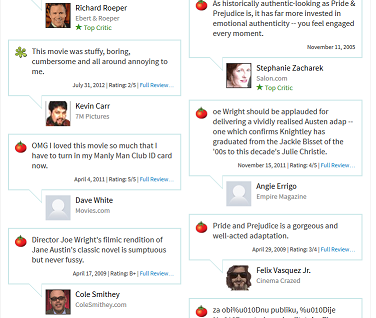
So it seems a lot of people actually liked the film... WoW

Fortunately, I then googled it and found several reviews that rather agreed with me; I'll be using some of their statements to back up my feelings about the film: there's Austen Authors, Frockflicks and some info comes from here as well.
Let's start with Elizabeth's hair:
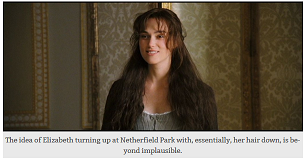
This may seem like nothing, but that's the problem: in Austen's novel, Elizabeth's appearance is already rather shocking for the time's standards: she has walked alone for 3 miles and appears in a very grand room with mud all over her shoes and skirt. But as Frocklicks points out, it is absolutely impossible that she should have called on someone without having her hair done.
The same thing can be said about Darcy's second proposal, which happens somewhere in a field, where Elizabeth has ventured alone - again! - and Darcy is half dressed, with barely a shirt and pants and his coat:

How on Earth could such a scene have happened?? In a time in which it was unthinkable for unmarried men and women to meet in private, unchaperoned circumstances... In the book, this scene takes place during a walk they take with Jane and Bingley, who are already engaged: the two couples are not very far from each other, which makes the scene appropriate. Most generally, the gentleman - for instance, Mr Collins in the film - would ask the parents if he may speak with their daughter alone. As this is the only acceptable reason to do so, the parents understand what it means and authorize him or not. But such a meeting, half-naked by the time's standards, alone, at the brink of day, in a field, is also "beyond implausible", to coin Frockflicks's phrase.
Talking about half-naked, this is Caroline Bingley's problem in the film (noted by both Austen Authors and Frockflicks):


As they both remark, this outfit is nothing like what a lady would have worn at Jane Austen's time, it equals to a lady's underwear... It is true that in the 1790s, at least in France, during the French Revolution, there was a fashion of women called "les Merveilleuses" that would probably be scandalous even today, because they wore very lose white gowns without any corset, and they have been caricatured a lot in their time (see below), but their dresses had sleeves!

...
Of course, those may all seem minor and superficial problems, but they are, in my opinion, very symptomatic of the main problem of the film: it wants to be modern, whereas the world it depicts is the exact opposite of modern. It is a society that relies on very strict codes and protocoles, and part of Jane Austen's goal, in writing her novels, was to criticise some of these strict rules! Many of her characters are to be seen as caricatures used to illustrate a specific flaw in a person's attitude.
So Joe Wright tries to make the film modern by our standards while it should look modern by Jane Austen's.
And yet, Austen was not that modern. She was also very conservative on many points. For instance, in Mansfield Park, she is totally opposed to the idea of organising private theatricals, because it is not appropriate. Nobody in our time would find that shocking, and I did indeed, as a child or a teenager, engage in several home theatricals with my cousins. Moreover, although Austen's Pride and Prejudice is clearly about not giving too much importance to wealth and connection when there is a real affection in a match, Bingley and Darcy are not inappropriately out of Jane and Elizabeth's reach, as she tells Lady Catherine: "He is a gentleman, I am a gentleman's daughter. So far we are equal." What she means by that is that they are both part of the same social class - although "social classes" did not exist at such at the time -: they are both from the landed gentry. So what she advocates for is being a little flexible, when feelings are concerned, in the limits of what is acceptable.
And this is where I think the film totally fails to represent Jane Austen's novel's meaning. The film turns her story into a basic Hollywood romantic story - which it is not! The best illustration is the final scene, that was apparently added at the end because the American audience wanted more romantic moments... AAARGH!!

Again, how does this work? They are at Pemberley, they have dozens of servants, it is unthinkable that they would sit on the table on the terrasse, in their shift, event at night. This is 21st century romanticism, not early 19th!
Another thing I reproach the film for, is the dialogues. Some of the lines spoken by the characters are the actual dialogues from the book, but in almost every scene, at one point, they stop using them and re-invent the whole conversation, with a much more modern tone. I can understand the will - although I do not share the feeling - to update or upgrade the dialogues a bit, as they may not sound very natural to a modern audience, but then, why use Austen's lines at all? All it does, in my opinion, is create a strange gap between the very uptight parts and the more modern ones, and I guess it must get the hardcore fans very angry whenever the film breaks free of the original text. Bingley starts his proposal by saying he has been "the most unmitigated, uncomprehensive ass."...!!!
Yet another reproach is that the film barely scratches the surface of most characters and suppresses many important subplots, which deprives the story of most of its meaning:
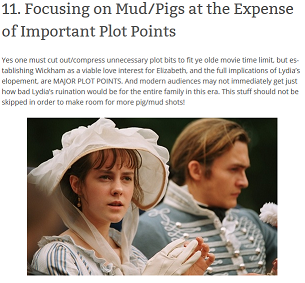
For instance, we don't see Wickham long enough to really understand any strong partiality on Elizabeth's part. Then, as Frocklicks points out, Lydia's elopement doesn't last more than a few minutes and Wickham's character is never really analysed. Nor is Lydia's. A modern audience may not understand fully the implications of this subplot regarding Elizabeth and Jane's prospects. Mr Collins is not half as annoying as he ought to be - and not vicious at the end -, and the very first scene, which is so famous - "It is a truth universally aknowledged [...]" - is only half-shown because we see it from the girls' partial point of view, trying to eavesdrop the conversation. The girls are giggling - as they always are, and especially Elizabeth giggles far too often - and we miss half of Austen's lines...
As for the male characters, I must admit I am a little partial to Matthew Macfadyen, whom I find rather handsome; yet again, some of his lines and interpretations are too modern to please me. Bingley, however, is a real fool in the film, as most of his lines are modern re-writings and make him a rather comically clumsy character, which would have not been a bad idea, had he not been always smiling in a foolish sort of way...

There are many other things I didn't like in the film, but I can't remember them all... For instance, Elizabeth doesn't tell Jane about Darcy's first proposal, and I can't understand why. Also, when Darcy learns about Lydia's elopement, Elizabeth is supposed to believe that he despises her family again and will never want her anymore, but there is no such thing in the film, and I cannot fathom why the film thus deprives itself of a very welcome dramatic tension that would make Darcy's proposal in the end more unexpected and therefore so much more romantic - which seems to be the goal of the film...
All this being said - and I do realise it's a lot - the film is not all bad. Indeed, it is very beautiful. The scenery, the lighting, the framing of the shots, and the directing in general are remarkable:




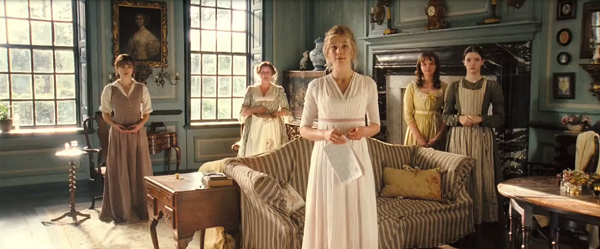
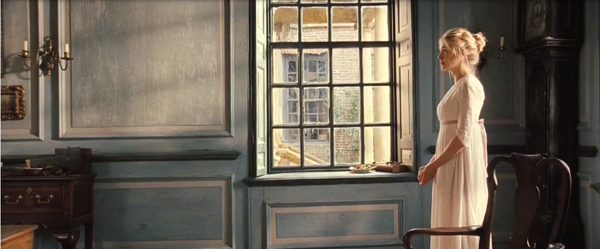
Besides, I may not be a big fan of Keira Knightley's performance, but at least, she is the right age to play the part (as opposed to the otherwise great 1995 BBC miniseries).
There is also one (short) scene, which is a complete addition, that I liked very much: after Bingley and Darcy have called at Longborn and Bingley has failed to propose, the gentlemen both stand by the river and talk about the failure. Darcy is very supportive, Bingley trains at proposing and Darcy plays Jane's part in the matter. The reason why I find this addition very interesting is because it is rather funny and it is one of the very few moments in the film that really give the substance I was expecting to the characters: this shows Bingley and Darcy's complicity and also shows how difficult it must be, especially at the time, for a man to propose. It is something Jane Austen never wrote about - she didn't even write the proposals - but as the scene is short and uses much editing to suggest the passing of time and the many attempts, this is typically a cinematic scene, rather than a literary one. This is an adaptation of Jane Austen's work, but it is also a film, and its rather artful use of cinematic tools is, despite all its faults, to be praised.

My overall conclusion is therefore: Joe Wright's Pride and Prejudice is probably not a bad film, only a bad adaptation. It is very difficult for me to judge it only as a film, so I can't speak for sure, but it seems that, as long as a romantic film is concerned, Pride and Prejudice has been much appreciated. It is beautiful and full of rather passionate moments, filmed in a passionate way (from a cinematic point of view). If you're looking for historic authenticity or Jane Austen's famous irony and characterization though, you will clearly not find it here. In the end, by making this film more modern, to suit the expectations of a modern audience, Joe Wright deprived the story of most of its deep meaning, ie, Jane Austen's modernity.
Now, if you're looking for a much more faithful and wittier, yet very modern adaptation of Pride and Prejudice, you may be interested in Gurinder Chadha's Bride and Prejudice
 Of course, you must then forget about the period costumes and period settings, as the film takes place in 21st century India, but otherwise, as far as the story is concerned, I think it is a much more interesting - and critical - adaptation of Jane Austen's masterpiece, as it uses its source material to operate a criticism of our modern world.
Of course, you must then forget about the period costumes and period settings, as the film takes place in 21st century India, but otherwise, as far as the story is concerned, I think it is a much more interesting - and critical - adaptation of Jane Austen's masterpiece, as it uses its source material to operate a criticism of our modern world. Tags : Jane Austen, England, society, #LoveJaneAusten, film
Tags : Jane Austen, England, society, #LoveJaneAusten, film
-
Commentaires

